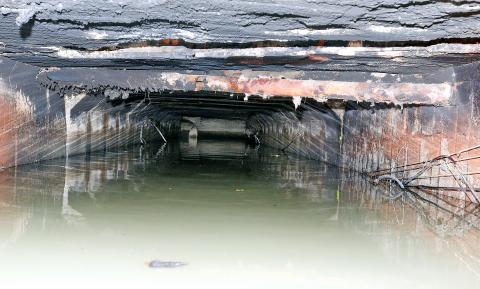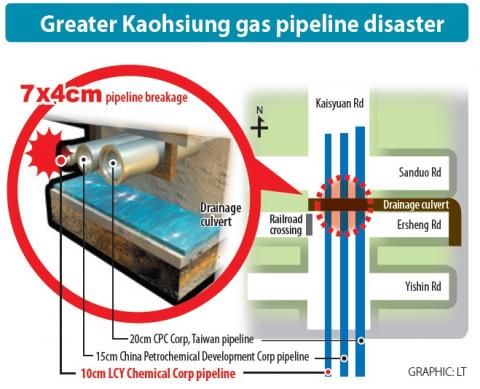Democratic Progressive Party (DPP) Legislator Kuan Bi-ling (管碧玲) accused CPC Corp, Taiwan (CPC, 台灣中油) of illegally laying pipelines to carry petrochemicals that were registered for carrying petroleum.
CPC made public earlier this week a document showing that of the 16 pipelines it helped to renew in 1990, only six belonged to it, while Taiwan Polypropylene Co Ltd (福聚) — which merged with LCY Chemical Corp (李長榮化工) in 2007 — owned one of the remaining 10 pipelines.
CPC displayed the document to refute LCY Chemical’s earlier accusation that CPC was responsible for safety inspections of the pipeline that has been found to have leaks and is suspected as the possible cause of the explosions last week in Greater Kaohsiung.

Photo: Chang Chung-yi, Taipei Times
CPC said that the owner of each pipeline, LCY Chemical in this case, has sole responsibility for maintaining their infrastructure.
However, Kuan said that CPC’s document exposed flaws in the firm’s use of the pipelines.
While the document is about the renewal of “long-range petroleum pipelines,” 11 of the 16 pipelines documented, including two used by CPC, have been used to transport petrochemicals, Kuan said.

She said CPC’s pipeline installations in the area are illegal, citing the Rules for Enforcement of the Urban Planning Act in Kaohsiung City (都市計劃法高雄市施行細則) from 1989, which says the petrochemical industry is restricted to special industrial zones and is not to have its pipelines carrying hazardous materials through residential or commercial zones as designated by the local government.
An aide of Kuan, surnamed Chen (陳), said it is “highly unlikely” that the municipality’s Cianjhen (前鎮) and Lingya (苓雅) districts, where the explosions occurred, were once part of the special industrial zones.
“CPC also helped Formosa Plastics Group (FPG, 台塑集團) to build three pipelines [carrying petrochemical materials]. Why would CPC, FPG’s competitor, do such a thing? Clearly it was not up to the CPC, a state-run company, to make the decision. The Ministry of Economic Affairs should not evade the history of the municipality’s industrial structure or shun responsibility by claiming that it only has jurisdiction over petroleum and natural gas pipelines,” Kuan said.
Kuan also said that the ministry sponsored advertisements for the petrochemical industry in 2010, in which it asked where people could find waterproof umbrella cloth, toothpaste, toothbrushes or tires without the petrochemical industry.
“The ministry acted as the competent authority of the industry then, but now it tries to run as far as possible away from it,” Kuan said.
Meanwhile, the legitimacy of a drainage culvert that had three illegally installed pipelines is itself in doubt, with Water Resources Bureau Director Lee Hsien-yi (李賢義) saying the culvert cannot be found in the bureau’s records.
“We would never allow pipelines in the box culverts under our supervision,” Lee said, adding that the bureau is trying to find out which department built the culvert to determine whether its construction preceded the installation of the pipelines.
The Greater Kaohsiung District Prosecutors’ office said yesterday that the culvert along which the explosions occurred is not on its charts and is considering whether to dig up the culvert for closer examination.
The office recently isolated the potential source of the explosion to a culvert at the intersection of Ersheng and Kaisyuan roads, confiscating a section of a heavily corroded pipeline used by LCY Chemical to store and deliver propene, the gas blamed for the explosions. Culverts should not have any pipelines attached to them, the office said.
A section of LCY Chemical’s pipeline that crossed an underground storm drain and had a hole apparently caused by corrosion was blamed for the leaking propene, according to the results of a preliminary investigation.
Meanwhile, Minister of Economic Affairs Chang Chia-juch (張家祝) said that he did not understand why the pipeline, which had been treated to resist corrosion underground, but not in the air, had been placed over a storm drain, which exposed it to the air.
Additional reporting by Jack Chung and CNA

Seventy percent of middle and elementary schools now conduct English classes entirely in English, the Ministry of Education said, as it encourages schools nationwide to adopt this practice Minister of Education (MOE) Cheng Ying-yao (鄭英耀) is scheduled to present a report on the government’s bilingual education policy to the Legislative Yuan’s Education and Culture Committee today. The report would outline strategies aimed at expanding access to education, reducing regional disparities and improving talent cultivation. Implementation of bilingual education policies has varied across local governments, occasionally drawing public criticism. For example, some schools have required teachers of non-English subjects to pass English proficiency

‘FORM OF PROTEST’: The German Institute Taipei said it was ‘shocked’ to see Nazi symbolism used in connection with political aims as it condemned the incident Sung Chien-liang (宋建樑), who led efforts to recall Democratic Progressive Party (DPP) Legislator Lee Kun-cheng (李坤城), was released on bail of NT$80,000 yesterday amid an outcry over a Nazi armband he wore to questioning the night before. Sung arrived at the New Taipei City District Prosecutors’ Office for questioning in a recall petition forgery case on Tuesday night wearing a red armband bearing a swastika, carrying a copy of Adolf Hitler’s Mein Kampf and giving a Nazi salute. Sung left the building at 1:15am without the armband and apparently covering the book with a coat. This is a serious international scandal and Chinese

TRADE: The premier pledged safeguards on ‘Made in Taiwan’ labeling, anti-dumping measures and stricter export controls to strengthen its position in trade talks Products labeled “made in Taiwan” must be genuinely made in Taiwan, Premier Cho Jung-tai (卓榮泰) said yesterday, vowing to enforce strict safeguards against “origin laundering” and initiate anti-dumping investigations to prevent China dumping its products in Taiwan. Cho made the remarks in a discussion session with representatives from industries in Kaohsiung. In response to the US government’s recent announcement of “reciprocal” tariffs on its trading partners, President William Lai (賴清德) and Cho last week began a series of consultations with industry leaders nationwide to gather feedback and address concerns. Taiwanese and US officials held a videoconference on Friday evening to discuss the

PERSONAL DATA: The implicated KMT members allegedly compiled their petitions by copying names from party lists without the consent of the people concerned Judicial authorities searched six locations yesterday and questioned six people, including one elderly Chinese Nationalist Party (KMT) member and five KMT Youth League associates, about alleged signature forgery and fraud relating to their recall efforts against two Democratic Progressive Party (DPP) legislators. After launching a probe into alleged signature forgery and related fraud in the KMT’s recall effort, prosecutors received a number of complaints, including about one petition that had 1,748 signatures of voters whose family members said they had already passed away, and also voters who said they did not approve the use of their name, Taipei Deputy Chief Prosecutor